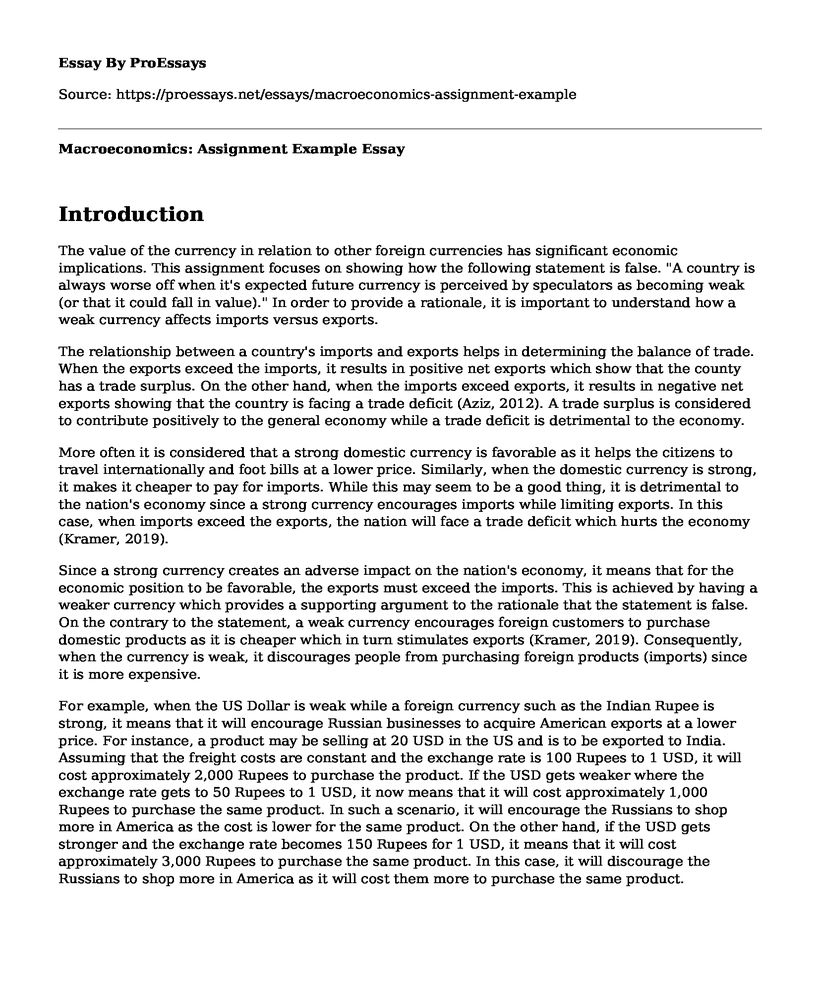Introduction
The value of the currency in relation to other foreign currencies has significant economic implications. This assignment focuses on showing how the following statement is false. "A country is always worse off when it's expected future currency is perceived by speculators as becoming weak (or that it could fall in value)." In order to provide a rationale, it is important to understand how a weak currency affects imports versus exports.
The relationship between a country's imports and exports helps in determining the balance of trade. When the exports exceed the imports, it results in positive net exports which show that the county has a trade surplus. On the other hand, when the imports exceed exports, it results in negative net exports showing that the country is facing a trade deficit (Aziz, 2012). A trade surplus is considered to contribute positively to the general economy while a trade deficit is detrimental to the economy.
More often it is considered that a strong domestic currency is favorable as it helps the citizens to travel internationally and foot bills at a lower price. Similarly, when the domestic currency is strong, it makes it cheaper to pay for imports. While this may seem to be a good thing, it is detrimental to the nation's economy since a strong currency encourages imports while limiting exports. In this case, when imports exceed the exports, the nation will face a trade deficit which hurts the economy (Kramer, 2019).
Since a strong currency creates an adverse impact on the nation's economy, it means that for the economic position to be favorable, the exports must exceed the imports. This is achieved by having a weaker currency which provides a supporting argument to the rationale that the statement is false. On the contrary to the statement, a weak currency encourages foreign customers to purchase domestic products as it is cheaper which in turn stimulates exports (Kramer, 2019). Consequently, when the currency is weak, it discourages people from purchasing foreign products (imports) since it is more expensive.
For example, when the US Dollar is weak while a foreign currency such as the Indian Rupee is strong, it means that it will encourage Russian businesses to acquire American exports at a lower price. For instance, a product may be selling at 20 USD in the US and is to be exported to India. Assuming that the freight costs are constant and the exchange rate is 100 Rupees to 1 USD, it will cost approximately 2,000 Rupees to purchase the product. If the USD gets weaker where the exchange rate gets to 50 Rupees to 1 USD, it now means that it will cost approximately 1,000 Rupees to purchase the same product. In such a scenario, it will encourage the Russians to shop more in America as the cost is lower for the same product. On the other hand, if the USD gets stronger and the exchange rate becomes 150 Rupees for 1 USD, it means that it will cost approximately 3,000 Rupees to purchase the same product. In this case, it will discourage the Russians to shop more in America as it will cost them more to purchase the same product.
Conclusion
In conclusion, it is evident that a weak currency encourages exports and hampers imports. This is because a devaluation in currency makes it easier for domestic manufacturers to sell more in foreign markets since it makes foreign products less competitive.
References
Aziz, N. (2012). Does a real devaluation improve the balance of trade?: Empirics From Bangladesh Economy. The Journal of Developing Areas, 46(2), 19-41. doi: 10.1353/jda.2012.0033
Kramer, L. (2019). Interesting Facts about Imports and Exports. Retrieved from https://www.investopedia.com/articles/investing/100813/interesting-facts-about-imports-and-exports.asp
Cite this page
Macroeconomics: Assignment Example. (2022, Mar 15). Retrieved from https://proessays.net/essays/macroeconomics-assignment-example
If you are the original author of this essay and no longer wish to have it published on the ProEssays website, please click below to request its removal:
- Discrimination, Performance Management, Performance Appraisal, Affirmative Action and Employment
- Research Paper on Capitalism
- Capitalism and Real Estate Essay Example
- Essay on Derived and Fluctuating Demand and Buying Centers
- Essay Sample on Aggregate Demand and Supply
- Labor Relations: Interaction Among Key Actors - Essay Sample
- Investing in Employee Training: Benefits vs. Challenges - Essay Sample







